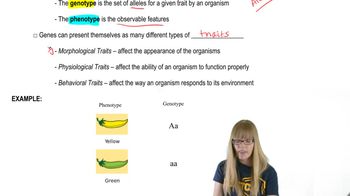Here are the essential concepts you must grasp in order to answer the question correctly.
Sex Determination
Sex determination refers to the biological process that dictates the development of sexual characteristics in an organism, primarily influenced by the presence of specific sex chromosomes. In mammals, the presence of the Y chromosome typically leads to male development, while its absence results in female development. The Tfm mutation in mice illustrates how genetic factors can disrupt this process, leading to atypical sexual differentiation despite the presence of male chromosomes.
Recommended video:
Hormonal Influence on Sexual Differentiation
Hormonal influence on sexual differentiation involves the role of hormones, particularly androgens like testosterone, in the development of male characteristics. In normal male development, testosterone promotes the formation of male external genitalia and secondary sexual traits. The Tfm mutation disrupts this hormonal response, indicating that the gene product associated with Tfm is crucial for mediating testosterone's effects during sexual differentiation.
Recommended video:
Genetic Engineering in Experimental Design
Genetic engineering involves manipulating an organism's DNA to study the effects of specific genes or mutations. In the context of the Tfm mutation, one could design an experiment to create genetically modified mice that either express or lack the Tfm gene. By observing the resulting sexual differentiation in these mice, researchers could confirm the role of the Tfm gene product in mediating testosterone's effects and further elucidate the mechanisms of sex determination.
Recommended video:






